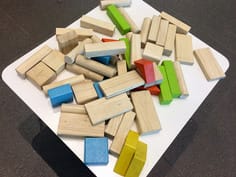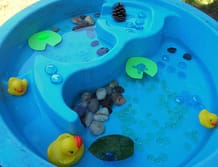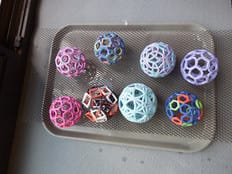Program Benefits
Program Outline and Benefits
Both the School Age and Preschool Program offer a balance of planned and free choice activities throughout the day.
The purpose of the School Age Program curriculum is to expand the knowledge base introduced in the school system and to allow children to explore individual areas of interest and recreation.
The purpose of the infant/preschool program is to provide an environment to enrich all areas of the child’s development on a daily basis.
Benefits of Outdoor Play →
Benefits of Reading →
Benefits of Creativity →
Benefits of Tactile Exploration →

Creative Art
During these activities children learn self concept, foster listening skills, sharing, cooperation, and to express their ideas and feelings using their imagination and creativity.
They learn to make choices, sharing, enhance fine motor development and gain pleasure in their environment through sensory experiences.
Block Play
Children develop motor skills through lifting, reaching, grasping, stacking, and balancing.
It fosters hand-eye coordination, social skills, spatial skills, a capacity for creative, divergent thinking, and language skills.
Children can integrate their own constructions into pretend play scenarios. Complex block-play is linked with advanced math skills in later life.
Music
Whether through the playing of actual instruments, singing, dramatization, or combined with movement activities, music gives children joy.
Music ignites all areas of child development: intellectual, social and emotional, motor, language, and overall literacy.
It helps the body and the mind work together. Exposing children to music during early development helps them learn the sounds and meanings of words.
Dancing to music helps children build motor skills while allowing them to practice self-expression. Music helps strengthen memory skills.

Sensory / Tactile
There is great opportunity for children to explore their self-expressive abilities, gain confidence and esteem as there is no right or wrong answer.
Sensory also eliminates the fear and experience of failure. Children will investigate and build critical thinking skills, it helps to develop fine motor and coordination skills, socialize, spatial relations and understanding volume.
Dramatic Play
Through dramatic play children can experience and learn about environments, people and occupations in our world.
A variety of dress-up clothes, props and dramatic play props are rotated through the programs.
Children can explore the social rules of functioning in their peer group, a family or a larger group.
Dramatic play allows children to experiment with real life situations, increases language and is an emotional release.
Children learn to develop social skills, problem solve and experiment with solutions. It is a wonderful vehicle of imagination.
Manipulative Materials
Helps develop eye / hand coordination, fine motor skills, concept formation, problem solving and thinking skills.
Children gain confidence and learn to make sense of things, it teaches children about patterning, colors, counting, ordering, sorting and matching. This can be experienced with puzzles, lacing, counting and patterning toys or games.

Library
Literature is an integral part of children’s intellectual and emotional development.
By providing age appropriate books in the Centre children have an opportunity to learn vocabulary, enhance listening skills, and attention span.
Children learn to be creative, learn early reading skills, language/speech development, critical thinking skills and fosters a love for reading and learning for life long success.
Science Areas
Science experience guides children towards problem solving and knowledge of their immediate environment.
Areas such as the Science Centre, sand/sensory tables, water area and cooking activities teach children early mathematical skills, problem solving skills and inquisitiveness to pursue the who, what, where and why’s of our world.
Large Motor Areas
Access to the playgrounds provide the children opportunity to participate in physical exercise, develop sportsmanship qualities, increase eye / foot coordination and cooperative skills.
Math / Number Areas
This area introduces the children to measuring, counting, quantities, written numbers and shapes.It is the basic foundation for building confidence and basic skills for entering into kindergarten.
Children can learn how to problem solve and are introduced to the language of math.
